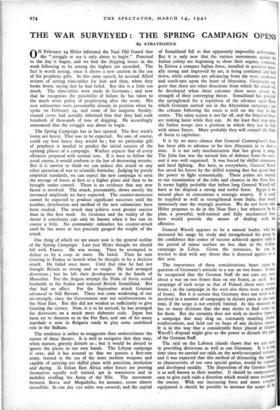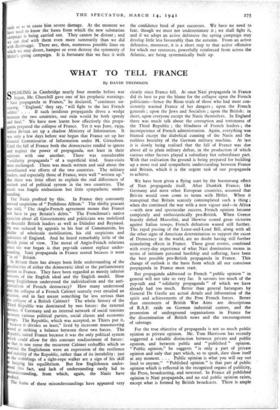THE WAR SURVEYED : THE SPRING CAMPAIGN OPENS
By STRATEGICUS
ON February 24 Hitler informed the Nazi Old Guard that the " struggle at sea is only about to begin." Punctual to the day it began, and we find the shipping losses in the week following to be among the highest yet recorded. The fact is worth noting, since it shows a new caution in the use of his prophetic gifts. In this same speech, he accused Allied writers of setting time-tables for him and then, when they broke down, saying that he had failed. But this is a little too much. The time-tables were made in Germany ; and now that he recognises the possibility of failure he has taken to the much wiser policy of prophesying after the event. His new submarines were presumably already in position when he spoke on February 24, and some of his sanguine freshly- trained crews had actually informed him that they had sunk hundreds of thousands of tons of shipping. He accordingly announced that the struggle was about to begin.
The Spring Campaign has in fact opened. The first week's losses are heavy. That was to be expected. No one, of course, could say how heavy they would be ; but no particular gift of prophecy is needed to predict the initial success of the opening phases of a campaign. Warfare expects that of every offensive prepared with normal care. If it were to follow the usual course, it would conform to the law of decreasing returns. But it is unwise to think we can reduce this attack or any other operation of war to scientific formulae. Judging by purely empirical standards, we can expect the new campaign to raise the average of losses at first to a higher plane and then to be brought under control. There is no evidence that any new factor is involved. The attack, presumably, shows merely the increased amplitude we have expected. The counter-measures cannot be expected to produce significant successes until the number, distribution and method of the new submarines have been studied. The attack may achieve even greater success than in this first week. Its virulence and the reality of the threat it constitutes can only be known when it has run its course a little. No commander unleashes his counter-attack until he has more or less precisely gauged the weight of the attack.
One thing of which we are aware now is the general outline of the Spring Campaign. Last year Hitler thought we should fall with France. He was wrong. Then he attempted to defeat us by a coup de main. He failed. Then he sent Goering to France to launch what he thought to be a decisive attack. He failed once more. Until that time he had not thought Britain so strong and so tough. He had arranged diversions ; but he left their development in the hands of Mussolini. For the August attempt the Duke of Aosta seized footholds in the Sudan and reduced British Somaliland. But that had no effect. For the September attack Graziani advanced to Sidi Barrani. There was some weakening of our air-strength, since the Government sent out reinforcements to the Near East. But this did not weaken us sufficiently to give Goering the victory. Now, it is to be noticed, he has arranged for diversions on a much more elaborate scale. Japan has been set to threaten us in the Far East, and one of his many marshals is now in Bulgaria ready to play some undefined role in the Balkans.
The tendency is rather to exaggerate than underestimate the nature of these threats. It is well to recognise that they may, when mature, gravely disturb us ; but it would be absurd to ignore the pieces in our own hands. The Libyan campaign is over, and it has assured us that we possess a first-rate army, trained in the use of the most modern weapons and capable of carrying out skilful plans with precision, resolution and daring. In Italian East Africa other forces are 'proving themselves equally well trained, apt in manoeuvre and in mobility rivalling the Army of the Nile. The movement between Brava and Mogadishu, for instance, seems almost incredible. In one day 12o miles was covered; and the capital of Somaliland fell to that apparently impossible achievement But it is only now that the various movements against the Italian colony are beginning to show their organic connexion. In Eritrea a compact Italian force, installed in positions natur. ally strong and improved by art, is being contained and held down, while columns are advancing from the west, south-west and south-east upon the heart of Abyssinia. Geography sug. gests that there are other directions from which the attack will be developed when these columns show more clearly the strength of their converging threat. Somaliland has provided the springboard for a repetition of the advance upon Harz which Graziani carried out in the Abyssinian campaign ; and the column following his route is well on the way to that centre. The rainy season is not far off, and the Imperial forces are making haste while they can. At the least they may drive the Italian troops into a position in which they can be held with minor forces. More probably they will compel the Duke of Aosta to capitulate.
It is by no mere chance that General Cunningham's force has been able to advance so far into Abyssinia in so short a time. It is not only mechanisation that has given it wings. The Juba line was the natural line of defence from the west; and it was well organised. It was forced by skilful manoeuvre and hard fighting. But here, as everywhere, General Wavell has saved his forces by the skilful training that has given then the power to fight economically. These points are material to our examination of the risks and chances in the Near East. It seems highly probable that before long General Wavell will have at his disposal a strong and useful force. Egypt is the natural place to concentrate a strategic reserve. If it could be supplied as well as strengthened from India, that would immensely ease the strategic position. We do not know what Hitler proposes to do in the Near East ; but whatever be his plan, a powerful, well-trained and fully mechanised force here would provide the means of dealing with the offensive.
General Wavell appears to be a natural leader, who has increased his range by study and strengthened his grasp he the confidence that comes of success achieved against odds in the period of minor warfare no less than in the brilliant campaign in Libya. Given the resources, he can be trusted to deal with any threat that is directed against us in this area.
The importance of these considerations bears upon the question of Germany's attitude to a war on two fronts. It must be recognised that the German Staff do not care any more about a war on two fronts than on ten fronts, as such. In a campaign of such scope as that of Poland, there were several fronts ; in the campaign in the west also there were a number of fronts. But it is certain that Germany does not wish to be involved in a number of campaigns in distant parts at the same time, if the scope is not entirely limited. At this moment she has so many divisions that she may desire to find some use for them. But she certainly does not wish to involve them in a campaign that may drag on, constantly entailing furtb6 reinforcement, and hold out no hope of any decisive succes5 It is in this way that a considerable force placed at General Wavell's disposal might give us the power to disturb the plan of the German Staff.
The raid on the Lofoten islands shows that we can ass:' in providing diversions as well as can Germany. It is a long time since we carried out raids on the newly-occupied territory'; and it was expected that this method of distracting the ellen15; so characteristic of our own special genius, would be repute' and developed steadily. The disposition of the German forces is as well known as their number. It should be comparatives easy to give such raids a direction which would most embarra-" the enemy. With our increasing force and more comply equipment it should be possible to increase the scope of 1114 raids so as to cause him severe damage. At the moment we have need to know the bases from which the new submarine campaign is being carried out. They cannot be distant ; and we can deal with them even more summarily than we did with Zeebrugge. There are, then, numerous possible lines on which we may divert, hamper or even destroy the symmetry of Hitler's spring campaign. It is fortunate that we face it with the confidence bred of past successes. We have no need to fear, though we must not underestimate it ; we shall fight it, and if we adopt an active defensive the spring campaign may develop little less favourably than the autumn. From an active defensive, moreover, it is a short step to that active offensive for which our resources, powerfully reinforced from across the Atlantic, are being systematically built up.































 Previous page
Previous page